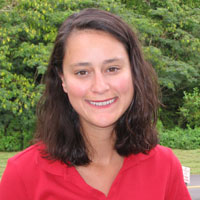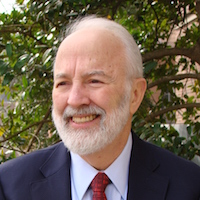Five Gillings School faculty win major awards for teaching, mentoring, research and service
May 10, 2019
Leaders at the UNC Gillings School of Global Public Health have announced the winners of four of the School’s most prestigious awards – the Bernard G. Greenberg Alumni Endowment Award for teaching, research and service; the John E. Larsh Jr. Award for Mentorship; the Edward G. McGavran Award for Excellence in Teaching; and the Harriet Hylton Barr Distinguished Alumni Award, which honors an alumnus or alumna for outstanding achievements and contributions to public health.
The 2019 winners are Jill Stewart, PhD, associate professor of environmental sciences and engineering and deputy director of the UNC Galápagos Initiative and the Center of Galápagos Studies (for the Greenberg Award); Barry M. Popkin, PhD, W.R. Kenan Jr. Distinguished Professor of nutrition (for the Larsh Award); Beth Moracco, PhD, associate professor of health behavior, and Karin Yeatts, PhD, associate professor of epidemiology (both for the McGavran Award); and John Wiesman, DrPH, secretary of health at the Washington State Department of Health and adjunct assistant professor of health policy and management at the Gillings School (for the Barr Award).
The awardees will be recognized at the Gillings School Commencement ceremony, taking place Saturday, May 11, at 1 p.m. in UNC’s Carmichael Arena.
Greenberg Award
Jill Stewart, PhD, was selected as the 2019 recipient of the Greenberg Award.

Dr. Jill Stewart
Stewart, who earned both a master’s and a doctoral degree in the Gillings School’s Department of Environmental Sciences and Engineering, joined the department faculty in 2008. In addition to her primary faculty appointment, she serves as a faculty fellow in the Carolina Population Center and a co-lead for the Global Health Concentration of the Gillings School’s Master of Public Health degree.
In 2010, she won a UNC Junior Faculty Development Award; in 2014, she was named a distinguished lecturer by the American Society for Microbiology; in 2015, she received a Gillings School Teaching Innovation Award based on student nominations.
In her research, Stewart develops novel techniques to detect and track pathogens in water. She is particularly interested in linkages between ecosystems and human health and well-being. Her areas of specialty include water and shellfish quality; she also is interested in evaluating the impacts of non-point source pollution and the manner in which activities like development and storm water management can affect human exposure to microbial contaminants. Overall, her research contributes to a greater understanding of how environmental conditions can affect human health and how humans themselves influence this process.
“Dr. Stewart’s recent focus on antibiotic resistance is particularly important, as antibiotic resistance is recognized as one of today’s major global public health threats,” one nominator wrote. “She has focused in particular on the contribution of animal agriculture to the evolution and increased prevalence of multidrug-resistant Staphylococcus aureus. Her research has shown that workers at swine farms are persistent carriers of such bacteria, which can then spread to other members of the workers’ households and to the local community. She also has studied how antibiotic-resistant bacteria spread in the environment.”
Another nominator — a retired Gillings School professor — noted that he has known Stewart since she came to his lab as a graduate student in 1996.
“I was happy to recruit her as a student, because I had a sense that she was destined for high achievement and success. I definitely was not wrong!” he wrote. “Professor Stewart’s creativity, innovations, technical advances and impactful research contributions over the last two decades have made it possible for her to become a major policy and practice influencer. Her work on applied and environmental health microbiology in the Galapagos Islands and her research into the microbial and health aspects of sanitation in the developing world are evidence of her willingness and ability to tackle some of the most challenging water, sanitation and hygiene problems that we as a society and global community now face.”
The Bernard G. Greenberg Alumni Endowment Award, established in 1986 by the School’s alumni association, is presented to an outstanding full-time, mid-career Gillings School faculty member for excellence in the areas of teaching, research and service. The award, which includes a cash prize of $12,000 annually for three years, honors Dr. Greenberg, a visionary leader who founded the School’s biostatistics department in 1949 and chaired it for more than 20 years before serving as dean of UNC’s public health school from 1972-1982. The major criterion for the award is continuous demonstrated excellence over a number of years in service to the broad public health community.
Larsh Award
Barry M. Popkin, PhD, is the winner of this year’s Larsh award.

Dr. Barry Popkin
Popkin, who joined the UNC faculty in 1976, holds a doctorate in agricultural economics from Cornell University. He established the Division of Nutrition Epidemiology at UNC and later founded and led the UNC Interdisciplinary Obesity Center, funded by the National Institutes of Health. He developed the concept of the Nutrition Transition — the study of the dynamic shifts in dietary intake, physical activity patterns, and trends around obesity and other nutrition-related diseases.
Having played a central role in announcing the concerns of global obesity — in part through his widely popular 2009 book, The World is Fat – Popkin now works to evaluate the impact of programs and policies meant to improve the health of populations during their time of transition. This work includes conducting collaborative sugar-sweetened beverages / junk food tax evaluation research in Mexico, Chile, South Africa, Colombia and Brazil.
Popkin has received a dozen major awards for his global contributions, including the 2016 World Obesity Society’s Population Science and Public Health Award. He has published more than 545 refereed journal articles and is one of the most cited nutrition scholars in the world. He has chaired the dissertation committees of nearly 60 doctoral students at the Gillings School and has served as principal investigator on grants totaling more than $135 million.
“Not only has Dr. Popkin been an important researcher and service contributor, he has spent a large proportion of time mentoring both undergraduate and doctoral students and junior faculty in the nutrition department,” began a nomination letter from a Gillings School faculty member. “He also helped to recruit and then worked for many years as a mentor to minority faculty in not only nutrition, but also the epidemiology and health behavior departments. [What really tells the story of his work, though, is that, a few years ago,] 40 former doctoral students flew in from the U.S., Asia and Western Europe to spend an evening together honoring Barry after he received the McCullom International Lectureship award from the American Society of Nutrition.”
“I grew up in a South Texas community where poverty and obesity are the norm,” wrote another nominator. “I was living on food stamps and Section 8 housing, even sleeping on cardboard for a while. I had good grades and big dreams — and no idea how unprepared I was for a high-caliber graduate program — so I applied to UNC’s Nutrition Epidemiology doctoral program to work with Barry. By the end of the first semester, I was doing poorly in my classes and thought I would get kicked out soon. […] Unlike me, Barry understood that, because of my background, it was normal that I needed to spend some time catching up. For years, it was his belief in me that kept me going. Considering that Barry is a world-class investigator, he could easily have decided it wasn’t worth the extra effort to help me close the gap, but he did help me — and his commitment to my success resulted in a Hispanic woman staying in science and contributing meaningfully to the public health landscape of her community.”
Established in 1997, the John E. Larsh Jr. Award for Mentorship recognizes a current member of the Gillings School faculty who best exemplifies the qualities of mentoring and commitment to students that Dr. Larsh embodied and valued so highly. Larsh was a health behavior faculty member from 1942 to 1981. The $4,000 prize may be used in any way that enhances the faculty member’s ability to mentor and support students.
McGavran Award
Beth Moracco, PhD, and Karin Yeatts, PhD, are the winners of the 2019 McGavran Award.

Dr. Beth Moracco
Moracco earned a doctoral degree from the Gillings School in 1999, joined the Department of Health Behavior faculty in 2008, and has served as director of that department’s master’s program since 2012. As a researcher and public health practitioner, she is skilled in intervention development and evaluation research and is an expert in engaging with communities and community-based organizations.
Her research focuses upon the primary and secondary prevention of gender-based violence in the U.S. and global settings using qualitative and quantitative methods. Moracco’s international work includes five years spent in the Democratic Republic of the Congo (DRC).
Currently, Moracco is the principal investigator for a study funded by the National Institute of Justice that evaluates best practices for domestic violence protective orders in North Carolina; a study examining firearm surrender and confiscation in domestic violence protective order cases; and a pilot study investigating the effectiveness of group-based peer support to decrease social isolation among newly-resettled female refugees from the DRC.
“Ten years out from my graduation, I can say that Beth Moracco has had a long-term impact on my life,” wrote a former student. “Beth gave me the opportunity to delve deeper into research and evaluation in the field of gender-based violence. The internship she created for me turned into a job offer at the state coalition against domestic violence. After three years, the Centers for Disease Control and Prevention (CDC)’s Division of Violence Prevention offered me a position in Atlanta. After four years in Atlanta, I founded a nonprofit dedicated to supporting survivors of sexual violence. Beth gave me, and many others, a jumping off point — not just by making connections and teaching useful content in a fun environment, but by believing in the value of my work and my ideas. […] Multiply the benefits that I’ve described by the many, many students she’s worked with throughout the years, and you’ll begin to quantify her far-reaching and significant impact.”
“I am delighted to nominate Beth Moracco for this award,” wrote one faculty member “Since returning to her alma mater in 2009, she has demonstrated unwavering commitment to the excellence of the health behavior department’s training programs through her teaching, mentoring and advocacy. Beth averages ten assigned advisees each year, and countless other students flock to her for mentoring. Whether students are seeking advice about evaluation methods or a personal crisis, Beth can be counted on to provide thoughtful guidance that is rooted in integrity.

Dr. Karin Yeatts
Yeatts studies pollution, respiratory disease and climate change-related health effects. As one of the few faculty members in the Department of Epidemiology who focus on these topics, she has led multiple large interdisciplinary teams to investigate related research questions. Currently, she is an investigator on a large National Institute of Environmental Health Sciences grant assessing how cookstove exposure impacts health. Yeatts also has served as co-chair of the Asthma Alliance of North Carolina since 2005.
She is an alumna of the Gillings School, having earned a doctoral degree in epidemiology in 1997. She conducted her doctoral research in Charlotte-Mecklenburg middle schools and, since that time, has worked across North Carolina in school systems (499 middle schools in 98 counties) and medical practices. She joined the Gillings School faculty in 2002, and currently leads the Master of Public Health concentration in applied epidemiology.
Yeatts’ teaching philosophy is based upon the principle of active learning. For both in-person and online classes, she designs and teaches courses that focus on collaborative and experiential learning. In 2015, she won a campus-wide University Teaching Award for her approach.
“As a person, Karin is extremely empathetic and warm,” wrote a student nominator. “She is dedicated to connecting with each person she comes in contact with, and you can tell when interacting with her that she genuinely cares about you as an individual. As a professor, she is equally determined; she whole-heartedly welcomes feedback and implements all the positive changes she can. Her passion for epidemiology is apparent and helps students understand just how important the subject is.”
“Karin has played an instrumental role in developing, delivering and improving the Gillings School’s Master of Public Health Core,” wrote another nominator. “She has gone above and beyond the call of duty to deliver a high-quality and innovative course in the core; has rapidly adapted and improved this course and its delivery methods based on student feedback; and has volunteered her time to engage in linking core courses across semesters. She has displayed leadership, innovation and excellence in all aspects of this work, playing a role in shaping a program with the potential to influence University-wide curricular issues. The number of students Karin has positively influenced through this work number almost 200 this year, and more students will benefit in each subsequent year!”
The McGavran Award for Excellence in Teaching honors Edward G. McGavran, MD, MPH, dean of the UNC School of Public Health from 1947 to 1963 and proponent of “hands-on” field training for public health students. First given in 1975, the award recognizes career-long excellence in teaching by a faculty member at the Gillings School.
Barr Award
John Wiesman, DrPH, is this year’s Barr awardee.

Dr. John Wiesman
Wiesman, who earned a doctorate in public health executive leadership from the Gillings School in 2012, was appointed the secretary of health at the Washington State Department of Health in 2013. Major efforts currently under his leadership include leading End AIDS Washington, developing the Healthiest Next Generation, identifying and funding foundational public health services, implementing the Governor’s executive order to reduce suicides and prevent firearm injuries and deaths, and addressing the public health impacts of climate change.
Wiesman has been passionate about public health since reading a 1983 Time magazine article about disease detectives tracking Legionnaires’ disease, toxic shock syndrome and HIV. This story was the impetus for him to enter the field, in which he has transformed multiple health departments from providing individual clinical services to promoting community prevention efforts that make healthy choices easier and less expensive.
Currently, Wiesman serves as an adjunct assistant professor of health policy and management at the Gillings School; he also serves as a clinical professor of health services at the University of Washington’s School of Public Health.
“John started his career in 1986 and was in the first cohort of public health professionals trained to provide HIV counseling and testing,” wrote one nominator. “It was a very uncertain time, and John boldly stepped into the front lines of one of the biggest challenges public health has ever faced. [In later years], given his incredible expertise, credentials and passion for public health, he was the perfect person to assume the presidency of the National Association of State and Territorial Health Officials. He continues to serve on the executive committee of that organization and also on the CDC Director’s Advisory Committee. He recently was tapped to serve as co-chair of the President’s AIDS Advisory Council.”
“John epitomizes a servant leader,” the letter continued. “He often understates his many contributions as he focuses on his teams. He is humble and has the people skills that make others want to follow him and do their best. John is a joy to work with and an inspiration to all.”
Established in 1975, the Harriet Hylton Barr Distinguished Alumni Award recognizes the achievements of alumni and their contributions to public health. Each year, it honors a deserving graduate of the School working full-time in public health or in a related field. The award carries the name of its 1980 recipient, the late Harriet Hylton Barr, who earned a Master of Public Health degree from the Gillings School in 1948 and dedicated 28 years of service to the School as an association professor of health behavior and the first director of alumni affairs.
Contact the Gillings School of Global Public Health communications team at sphcomm@listserv.unc.edu.
